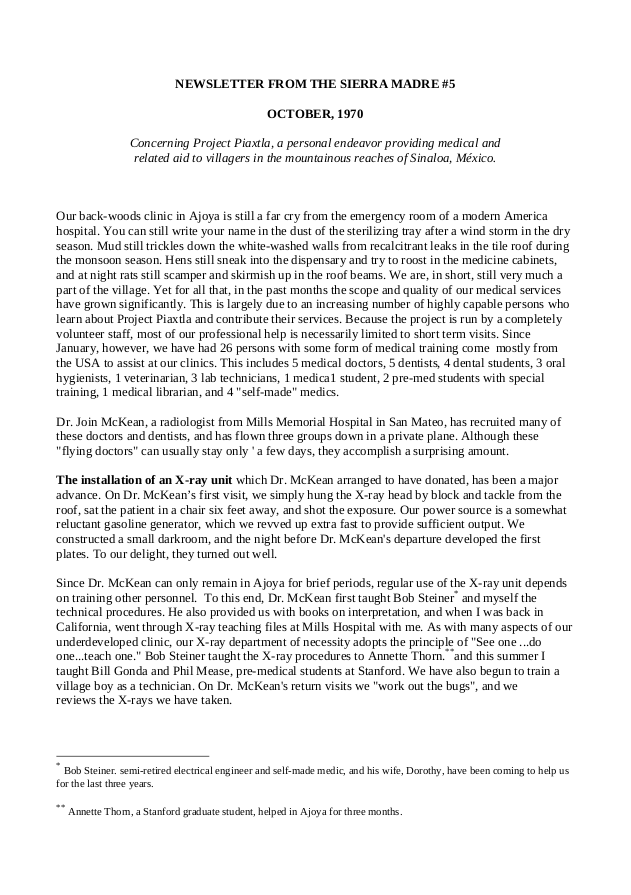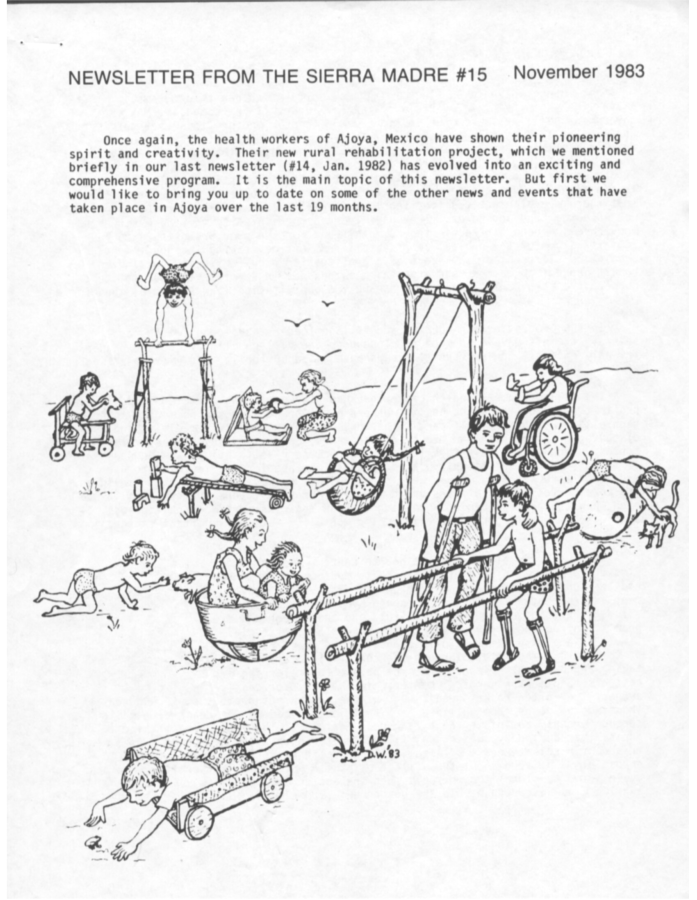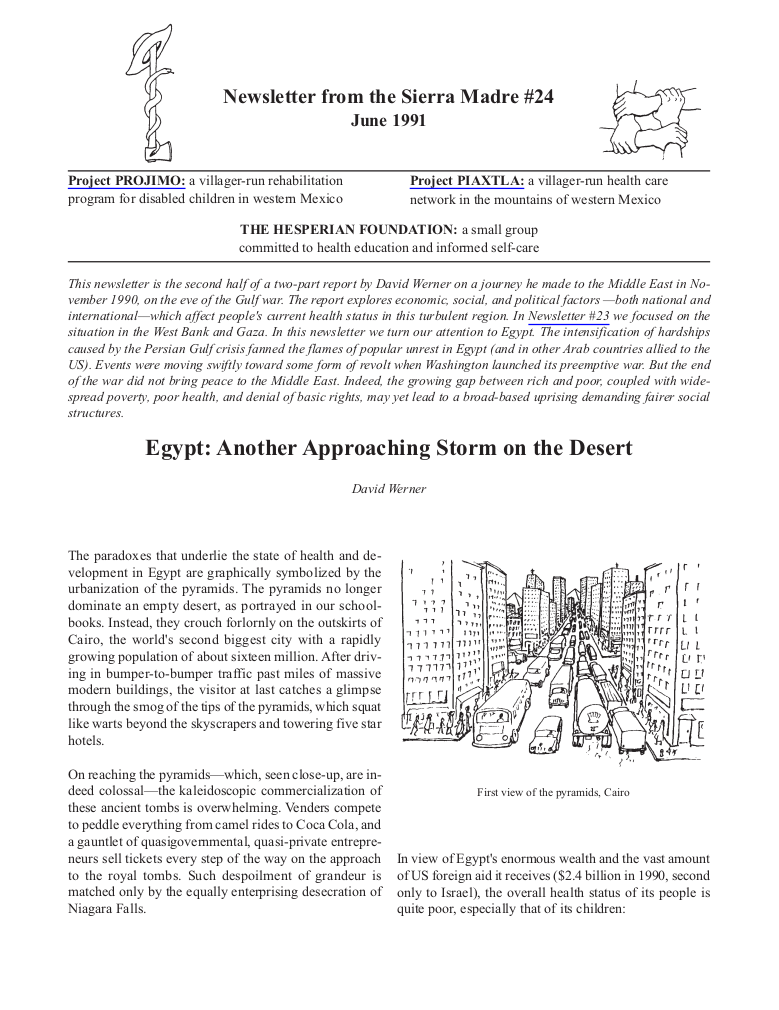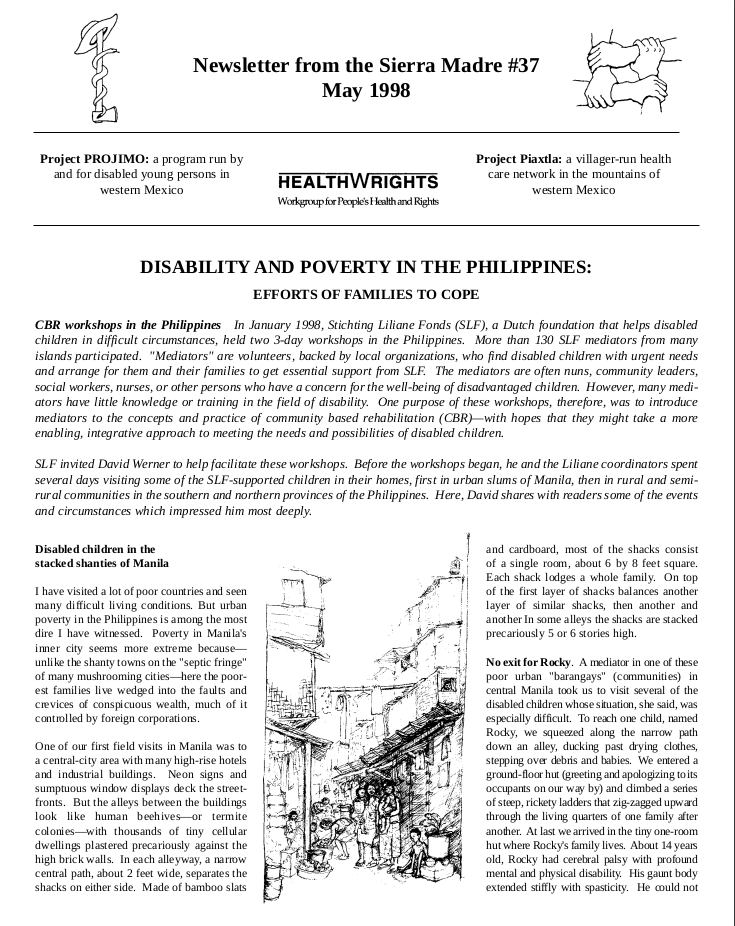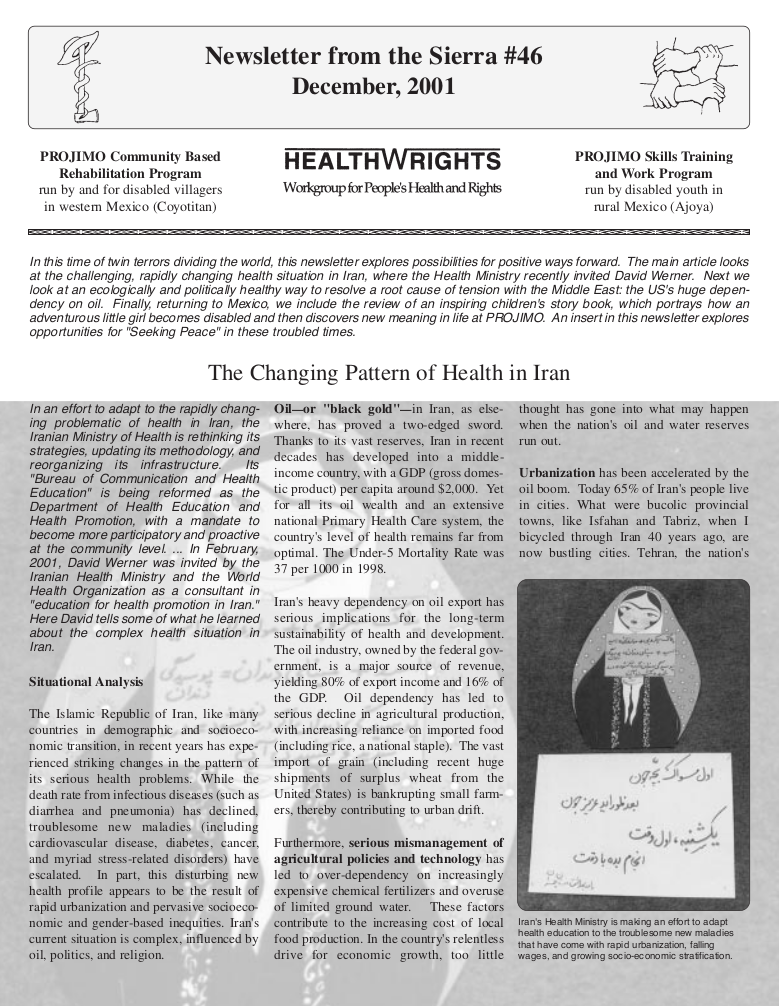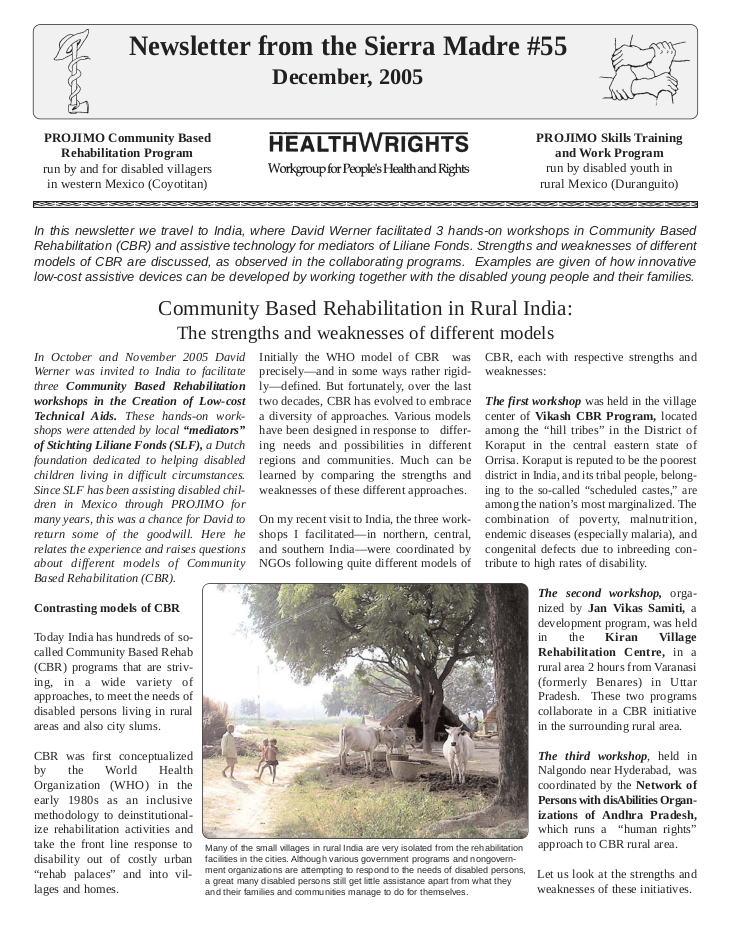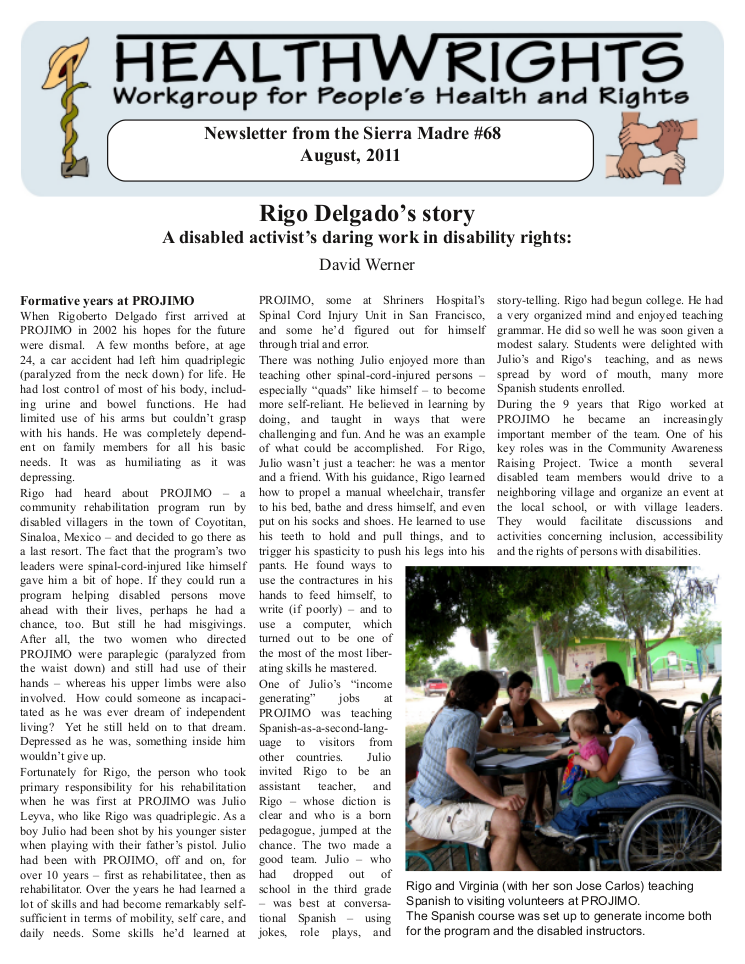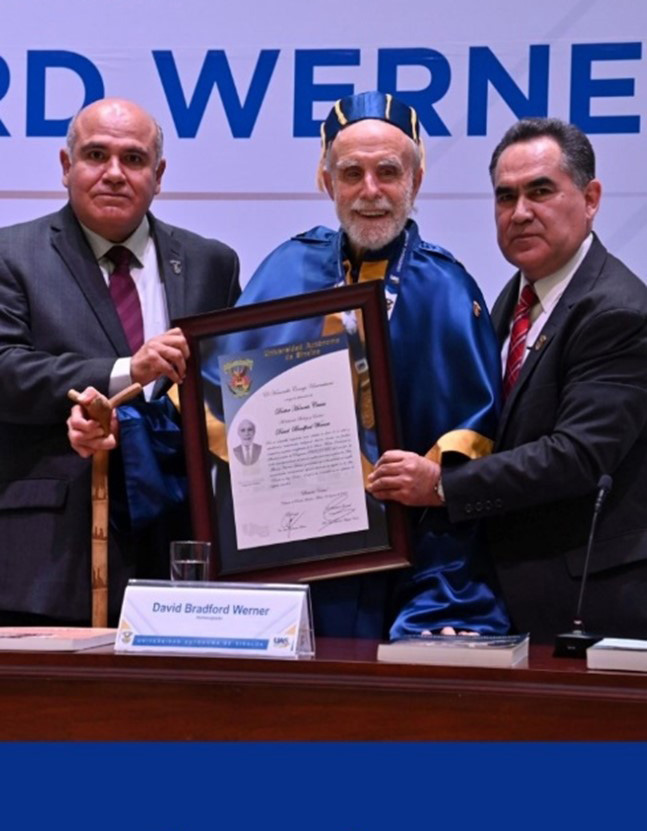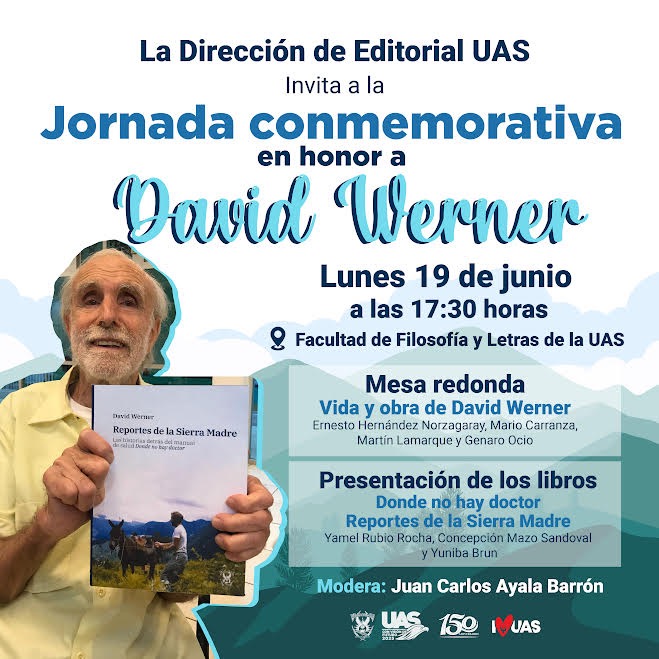#88 | David Werner receives honorary doctor degree in Mexico: Festivities spark reunion of long-lost friends and exciting new connections
#87 | Exciting updates: on the projects and publications in Mexico
#86 | Coping with COVID : The Need for Equality, Inclusion and Global Solidarity
In this newsletter, written in the time of COVID, we look at how the current pandemic affects the lives of poor people in the western state of Sinaloa, Mexico. We look at how “vaccination hesitancy” pervades even the most remote mountain villages. And we look at how improvised street theater and participatory roleplays based on observable evidence can help doubters sort reality from fiction and recognize the importance of getting vaccinated, not only for one’s own wellbeing, but for the collective wellness of all. The newsletter concludes with the proposition that if humanity is to overcome this pandemic and fend off far worse pandemics and global crises to come, we will need to radically transform our global economic model based on unbridled profit and greed of the few to a holistic approach based on sharing and caring, and on the well-being of all who live on our sacred but endangered planet. And we must do so soon, before we burn all our bridges to a livable and meaningful future.
Note: We are busy adding presentations from our 50 years of work at HealthWrights. The first is the Measles Monster, a slide show to combat vaccine hesitancy (see below). You can find a version with text captions here, or a version with voice-over narration here at Youtube. The images and captions are available in Spanish here and as well in the Spanish edition of the book Helping Health Workers Learn (Aprendiendo a Promover la Salud), pages 595-600, here.
#85 | ANNOUNCING A NEW BOOK BY DAVID WERNER: Reports from the Sierra Madre: Stories Behind the Health Handbook Where There Is No Doctor
#84 | INCLUSION OF THE MOST EXCLUDED — 'THE POWER OF STRING': Update on the Buddy Home Care Initiative in Ubon, Thailand
#83 | Finding a Paper-Based Solution for Mónica: Cardboard Cushions Help Heal Stubborn Pressure-Sores; the Searching for Disabled-Friendly Drug Rehab Centers; and the Passing of Mary Picos
We open this Newsletter sadly announcing that Mary Picos, the long-time director of PROJIMO, has passed away. The cause of her death, fulminating septicemia caused by an infected pressure sore, raises an issue near and dear to David’s heart: the use of cardboard to create and adapt low-cost solutions, a method originally developed by Bevill Packer, and discussed at length in Newsletter #82, and in Newsletter #34.
This Newsletter is, in ways, a sequel of #82 about Habilítate Mazatlán, a modest service program run by disabled recovering drug-users. Among services provided, they build—out of old cardboard—custom-made special seating for disabled children. Here we describe a related challenge the group has taken on: crafting custom-molded cardboard cushions to help heal chronic pressure sores…. We share this story because it conveys a great unmet potential. If more people and programs would make use of this low-cost handicraft, myriad dire complications and premature deaths from pressure sores could be prevented.
#82 | DISABLED RECOVERING DRUG-ADDICTS UNITED: A New Service Program Run by Disabled Recovering Drug-Users in Mexico; their Child-to-Child Workshop and Paper-Based Technology in Action
#81 | Health Services in a Land of Contradiction: Innovations in Thailand to Meet Health Needs of the Most Vulnerable
#80 | NAMESAKES: Inspired by Where There is No Doctor in Ghana, Guatemala, Chile, and Mexico
#79 | More Serendipitous Connections: A Boy with CMT Muscular Atrophy—Same as Me; Fitting him at PROJIMO Coyotitán
#78 | What Goes Around comes Around, Part 2: A Visit to the PROJIMO-Inspired ARSOBO Wheelchair and Prosthetics Workshop
#77 | What Goes Around Comes Around, Part 1: A Life-Threatening Snakebite Teaches Lesson about Establishment Medcinine; and a Serendipidous Connection
#76 | Helping Shy Tonio: Making his Home and One-Room Village School More Accessible with Child-to-Child
#75 | The Story of Dr. Miguel Angel: From Village Boy to Kind Eye Surgeon; and Ramon Ayala's Eye Surgery
#74 | Struggle for Health and Rights in South America's Southern Cone: Health Professionals Who Side with the Disadvantaged
#73 | Child-to-Child Workshops: Making Schooling More Inclusive for Disabled Children and More Enabling for All Children; and a Photo Essay
#72 | 'THE SILENCE THAT SCREAMS': Wise Writings of a Boy Who had No Voice for 12 Years, from the First International People's Health Assembly
#71 | The Rehabilitation of Miguel Angel: A PROJIMO Duranguito Success Story
#70 | Good News—And Not So Good News—From Bangladesh: David Werner Attends the 40th Anniversary of The People's Health Center
#69 | PRIMARY HEALTH CARE IN EAST TIMOR: The Challenge for Human, Environmental and Political Health
#68 | Rigo Delgado's Story: A Disabled Activist's Daring Work in Disability Rights
#67 | Children of the Moon: A Haven for Children of Sex Workers in Oaxaca, Mexico; Help Request for Health Wrights
#66 | The Evolution of Community Based Rehabilitation: David's Impressions of the 2nd Continental Congress on CBR
#65 | 'Where There Is No Doctor' in Japan: Exploring the Uses of a Village Healthcare Handbook in an Advanced Nation
#64 | Workshops in Peru with Stichting Liliane Fonds: Making Low-cost Assistive Devices for Disabled Children; Demystifying Rehabilitation; Paper-Based Technology
#63 | Remembering Marcello Acevedo: The Life of PROJIMO Co-Founder and Core Member, Husband, Father, Friend
#62 | Stichting Liliane Fonds in Columbia: Training Mediators to Create Assistive Equipment for Children in Medellín, Montería, and Cerro Vidales; In Memoriam: Marcelo Acevedo
#61 | Health in Harmony in Indonesia: Linking Local Health and Environmental Protection, and Helping Ocu to Walk
#60 | EDUCATION REFORM IN MEXICO: David Werner Leads a Child-to-Child Workshop; and PROJIMO Updates
#59 | Focus on South Africa: Community-Based Rehabilitation in Cape Town and Western Cape Province; Notes on Post-Apartheid Socioeconomic Polarization
#58 | HealthWrights Omnibus: Fighting for Incluion in Regular Schools; CBR Program near Patzcuaro; Innovative Toys from the 'Museum of Garbage'; Book Coming Soon: Choosing Our Future
#57 | Partnerships for Empowerment in Occupational Therapy: David's Keynote Address for the NYSOTA Conference; a New Book: Occupational Therapy Without Boarder; and PROJIMO Updates
#56 | Honduras—New Damage from Old Wounds: Consequences of U.S.-Backed 'Contra' War; Community Based Rehabilitation Initiatives; Migration to the U.S. and Struggles in the Wake of Hurricane Katrina
#55 | Community Based Rehabilitation in Rural India: Three CBR and Assistive Devices Workshops; PROJIMO Wins Film Award
#54 | Double Issue 53-54: Hands-on Workshops in Nicaragua Making Low-Cost Assistive Devices for Disabled Children; Open Copyright and Health; Update on PROJIMO
#53 | Double Issue 53-54: Hands-on Workshops in Nicaragua Making Low-Cost Assistive Devices for Disabled Children; Open Copyright and Health; Update on PROJIMO
#52 | Focus on Cuba 2: Adapting Community-Based Rehabilitation to the Cuban Context; Updates on PROJIMO
#51 | Focus on Cuba 1: Surviving the U.S. Embargo; Health and Welfare Achievements; Politics of Health in Cuba; and a PROJIMO Update
#50 | Struggle for Social Justice and Fair Trade in Bolivia: David's Workshop Interrupted; The Situation in Bolivia; an Update on the Politics of Health
#49 | Life After Injuries from Landmines in Columbia: Training Street Youth as Community Health Workers; Workshop on Assistive Devices for Disabled Children; and a PROJIMO Reunion in Mexico
#48 | Helping the Disabled in Rural Andhra Pradesh, India: Conducting a Survey; Exploring Sangams; and Visits to 'Neighborhood Houses'
This issue takes us to the state of Andhra Pradesh, India, where early this year David Werner went as a consultant for a statewide Rural Poverty Reduction Program. Although the consultancy concerned the needs of disabled persons, it turned out that the lack of adequate health care at the village level was a substantial contributing cause of poverty. The possibility arose for self-help groups of disabled villagers to play a central role in meeting the health needs of the whole community.
Also, as an insert within this Newsletter, we provide an update on our new Politics of Health Knowledge Network, a joint project of HealthWrights and the International People’s Health Council. See: www.politicsofhealth.org. [Editor’s note: This insert is missing.]
#47 | Tragedy and Hope: The Ajoya Massacre, the Evolution of PROJIMO, and introducing the Politics of Health Knowledge Network
#46 | Health in the Time of Twin Terrors: The Health Situatiuon in Iran's; the Root Causes of Tensions in the Middle East; and a Review of Molly Bang's Book 'Tiger Falls'
#45 | Working Toward a 'Livable Future': A Strategic Meeting led by Mulago Foundation; China's Struggle Against Tobacco; Conservation and Health; and a New Leg for the Professor
#44 | Shouting Down The World Bank: High Points and Shortcomings of the First International People's Health Assembly, 2000
This Newsletter is devoted to “PHA2000,” the first international event of the People’s Health Assembly, which took place in Bangladesh in December, 2000. Activists from nearly 100 lands testified to how the health of people and the environment is suffering due to global policies that put corporate profits before basic needs. A People’s Charter for Health (see insert) [Editor’s note: There is no insert.] was endorsed to help mobilize people throughout the world in the struggle toward a fairer, healthier, more sustainable social order.
Here you will not find a meeting report, but rather a critical look at what we can learn from PHA2000—its strengths and its weaknesses—in hopes of achieving a dynamic way forward and facilitating even better events for global solidarity in the future.
#43 | Global Ills and Popular Struggles in Ecuador: The People Speak Out at a Regional Forum in Cuenca, and Community Based Rehabilitation Training in Quito
#42 | Seeing the Forest for the Trees: Constructive Thoughts on the Deluge of Development Workers, Change Agents, Ecologists, and Evangelists in Oaxaca, Mexico; and Updates on PROJIMO and the People's Health Assembly
The main article in this newsletter tells you about a number of remarkable projects on the coast of the state of Oaxaca, Mexico. These projects are of timely importance as possible models for the direction we need to move in if we are to overcome the interrelated social, economic and ecological crises of our times. Yet we would be wise to learn from the weaknesses and blindspots of such pioneering projects as well as from their strengths and visionary spirit.
The Newsletter also includes an update on PROJIMO and shows some of the innovative wheelchairs and other mobility aids that it custom designs for individual disabled children. An update on the People’s Health Assembly includes a PHA Facts Sheet for those who may want to be involved or attend the international event in December. Announcements include a new paper by D.W. on Poverty and Health in the North; a guidebook for care of Landmine Victims, and a new video on PROJIMO.
#41 | From Genocide to Paternalism: Facing the Intractable Health Problems of Australia's Aboriginal People; Flying Foxes; PROJIMO Splits in Two; and an Update on the People's Health Assembly
The main article of this Newsletter looks at the enormous inequalities in Australia, in terms of health and self-determination, and the complex difficulties and challenges faced by the country’s original—or “Aboriginal”—inhabitants. It shows that public welfare assistance, when accompanied by discrimination and inequality can lead to spirit-crushing dependency and disease patterns associated with marginalization and the loss of hope. However, a growing movement among Aboriginal leaders and activists is working toward community control and assertion of equal rights.
Other brief articles here look at an attempt to save Australia’s north-eastern rainforests, and an update on PROJIMO’s new locations and activities.
Finally, there is a progress report on the upcoming “People’s Health Assembly”, with an invitation for people and groups concerned with the health and sustainability of humanity and the planet to participate in some of the preparatory meetings and activities.
#40 | Making Life Better for Special Needs Children: Los Chavalitos & Child-to-Child in Nicaragua, a Custom Designed Seating Course, and Announcing the People's Health Assembly
#39 | PROJIMO for Disabled and Jobless Youth: The Skills Training and Work Program; WHO Meeting in Kazakhstan; and New Japanese Translation of 'Questioning the Solution'
This Newsletter’s lead article looks at PROJIMO’S budding Skills Training and Work Program. It shows how disabled young persons—many of whom have come out of Mexico’s new sub-culture of crime and violence—teach unemployed village youth useful skills ranging from making coffins to building children’s wheelchairs. This lets them earn a living in ways that help disadvantaged people and the endangered environment rather than harm them. One apprentice wheelchair maker is Alejandro, a boy who was shot in the spine by a policeman and is discovering new options. Next is a design for an All Terrain Wheelchair Carriage, sent by a reader of our book, Nothing About Us Without Us.
Then comes a brief report on the recent WHO meeting in Kazakhstan, on the 20th anniversary of the Alma Ata Declaration. The purpose: to analyze why the goal of “Health for All by the Year 2000” remains a distant dream—and where to go from here.
Finally, we describe the “book launchings”of the Japanese translation of Questioning the Solution, our politics-of-health book.
#38 | THREE GLOBAL HEALTH UPDATES: A 'Learning by Doing' Workshop at PROJIMO; Disability Activism in Singapore; and mental health institutionalization in the United States
#37 | HealthWrights Omnibus: Disability in the Philippines; PROJIMO-built Bus Ramp; IPHC Updates; Review of 'Questioning the Solution'; and a Warning about New International Treaty
#36 | PROJIMO Moves to Coyotitán: Through Overlapping Crises, Disabled Health Workers Discover a Renewing Solution
This Newsletter represents a major, if unfortunate, update to the PROJIMO story first outlined in Newsletter 25. In that Newsletter, David outlined how drug violence had changed the face of PROJIMO from child-focused to youth-violence focused:
In the first years of PROJIMO most children brought to the center had disabilities caused by polio or cerebral palsy. […] The growing number of spinal cord injured participants, however, has led to unforeseen changes in the nature and focus of PROJIMO. First, it has meant that the program now serves many more young adults. Second, many are spinal cord injured from bullet wounds. Most are young men (along with a few young women) whose injuries have resulted from involvement with alcohol and use and/or trafficking of drugs.
In this Newsletter, six years later, David Werner spills out all the sad and at times frightening problems facing the Mexican projects in Ajoya: violence, drugs, thuggery, theft, kidnapping, and more aligned to force PROJIMO to transform. The first step will be to move the rehabilitation activities to Coyotitán, 40 miles away from Ajoya. The second will be to refashion PROJIMO in Ajoya as a work-skills training program.
#35 | 'Health, Economics and the Environment': Toward Sustainable Develpment; Excerpts from 'Nothing About Us Without Us'; and IPHC Updates
#34 | Helping Disabled Children in Brazil: David Leads a Workshop Featuring Child-to-Child and Appropriate Technology; Announcing 'Nothing About Us Without Us'
#33 | Violence and Health in South Africa: A Child-to-Child Workshop led by Martín Reyes; Landmines; the Dictatorship in Chile; and Announcing our New Book 'Questioning the Solution'
This Newsletter explores the links between personal and structural violence. We describe a Child-to-Child workshop in South Africa, where school children identified violence as the biggest threat to their health. We look at growing crime and violence world-wide, relating this with a global economic order that widens the gap between rich and poor. Noting the spoils of war and the powerful lobby of the weapons industry, we protest the failure of the US government and its allies to effectively ban landmines. We call for a total ban! Next we look at the shift from dictatorial to economic oppression in Chile, and see how marginalized women there join in struggle for their health and rights.
We also launch our new book Questioning the Solution: The Politics of Primary Health Care and Child Survival. This book explores how the potentially revolutionary concepts of Primary Health Care have been undermined by powerful interest groups. As a case study, the authors use Oral Rehydration Therapy (replacement of fluids lost through diarrhea) to show the pitfalls of promoting technological solutions to resolve ills caused by social and economic injustice. To put the politics of 'death from diarrhea' into a real-life context, the book announcement is accompanied in this Newsletter by 3 true stories, 2 from Mexico and one from rural Kenya.
#32 | HealthWrights Omnibus: Disabled Karate in Madras; Taking the Best From the Indepenent Living and Community-Based Rehabilitation Movements; and Book Reviews
#31 | Giving the Disadvantaged a Fair Chance: Helping a Disabled Boy Stay in School; NAFTA's Effects on the Poor; Russian Translation of 'Disabled Village Children'; and the Greed Based Paradigm
#30 | Bad Air, Weak Blood, and Domination in Sierra Leone and Kenya: African Women Confront Health Threats; Against Proposition 187; and the Financialization of Health by the World Bank
This Newsletter takes us to Africa (Sierra Leone and Kenya) where David Werner has recently been consulting with the World Health Organization (WHO) in an initiative to help rural women identify and seek solutions to their biggest health-related problems. Working together with village women, the researchers try to build on their traditional knowledge and survival skills. The goal is to help disadvantaged women gain more control over their health and their lives. The Newsletter continues with news from PROJIMO and Piaxtla, then closes with the struggle against anti-immigrant Proposition 187 (‘Save Our State’), and closes with a discussion about how the ‘structural adjustment programs’ forced by the World Bank upon struggling nations financializes matters of health:
“But on reading further, we discover that under the guise of promoting an equitable, costeffective, decentralized, and country-appropriate health system, the World Bank’s key recommendations spring from the same sort of structural adjustment paradigm that has worsened poverty and further jeopardized the health of the world’s neediest people.”
#29 | The Politics of Health in the Sierra Madre: How the Uprising in Chiapas Revitalized the Struggle for Health in Sinaloa
#28 | FROM THE GLOBAL HEALTH FRONT: The Health Struggle in the Slums of Nairobi, and John Fago Visits a Local Prosthetics Workshop in Cambodia
#27 | American Foreign Policy in the Americas: the North American Free Trade Agreement; and a Report from John Fago
#26 | Focus on Nicaragua: Healthcare Systems and Health Trends; and Letters to the Editor
#25 | A CRISIS OF VIOLENCE: Gunshot-Disabled Youth Bring the Consequences of Mexico's Drug Trade into PROJIMO
#24 | On the Brink of War, Part 2: a Report from the Middle East focusing on Egypt; and Celebrating Trudy Bock's 70th Birthday
#23 | On the Brink of War, Part 1: a Report from the Middle East focusing on the Israeli Occupied Territories; and a Critical Examination of U.S. Policy in the Region
#22 | Personal Experiences in a Changing World: Conchita's PROJIMO Story; a Workshop in Angola; The Other Economic Summit; and an Interview with Medea Benjamin
#21 | Report from the Philippines: David Teaches Midwifery in Manila; Notes on the Election in Nicaragua; Consequences of the Drug War
#20 | Marcelo and Luis: Friendship at PROJIMO; Updates on 'The México Projects'; the Health Consequences of the 'War on Drugs'; and News from Hesperian
#19 | From Local Health to Global Politics: an Analysis of the Political and Health Consequences of Apartheid in South Africa
This Newsletter marks an important shift in David Werner’s approach, from a focus on local health matters to a broader, global perspective on health. He notes:
“In the world today, it has become clear that isolated struggles for health and equality, even in a remote village or slum, are inseparable from the global struggle for a more just world economic and social order.”
In this Newsletter, David provides his extensive observations on the political and health consequences of Apartheid in South Africa, the white supremacist regime that lasted from the 1950s to the early 1990s. David marks the parallels between the destabilization efforts of the SA regime in Mozambique to similar efforts by the US in South America. He then goes on to describe in detail the dismal conditions of poverty and lack of health infrastructure for poor Black communities living in slums. David then reports on the the letter writing campaign against the US War on Drugs, provides a couple short notes on tobacco policy, and a poem by a 12-year-old South African boy. The Newsletter concludes with a review of Disabled Village Children.
#18 | From Trees of Blood to Traffic of Drugs: An Important Update on Violence and Drug Trafficking in Mexico
#17 | LUPE THE WILDCAT: a PROJIMO Rehabilitation Story; Hesperian Wins WHO Award; and Announcing a New Book: Disabled Village Children
In this newsletter, which announces our new book, Disabled Village Children, we include the first part of a children's story by Molly Bang. Molly, a prize-winning author and illustrator of many children's books, visited PROJIMO in December, 1986. She made friends and had long talks with many of the disabled persons there, including both providers and receivers of the rehabilitation services.
The story of Lupe gives a revealing personal picture of PROJIMO, the community based rehabilitation program run by disabled villagers in western Mexico. We feel that Lupe's story will help you understand both the roots of our new book, Disabled Village Children, and the kind of “people-centered” program it advocates and is designed to serve. For a review of Molly Bang’s story, click here.
The Newsletter closes with news about the fight against diarrhea in Mozambique, and an important Project Piaxtla update: the return of Miguel Angel as a fully trained doctor.
#16 | Stories from PROJIMO: Bruce's Experience with Mari and Updates from PROJIMO; News from Project Piaxtla and Hesperian Foundation
#15 | THE BIRTH STORY OF PROJIMO: the Team Helps Teresa Smile; Piaxtla Versus the Government Health Center; and Where There Is No Doctor Now Part of Mexican Health Ministry Efforts
The newsletter opens with updates on Project Piaxtla. Detailed are the drama involving a government health clinic in Ajoya, the broadening use of Where There Is No Doctor by the Mexican Health Ministry, and an update on the Piaxtla corn bank.
The main topic of this newsletter, however, is PROJIMO, and it provides a good introduction to the project as it was first taking shape in 1983. The mission, staff, rehabilitation activities and technologies are all outlined. The rehabilitation story of Teresa illustrates the work of PROJIMO. The newsletter closes with updates about the Hesperian Foundation’s publications, and discussion of the early drafts of Disabled Village Children. NOTE: THIS NEWSLETTER CONVERSION IS INCOMPLETE. MORE IMAGES NEED TO BE INSERTED.
#14 | Women Unite Against Drunkeness: Project Piaxtla Updates; and Announcing 'Helping Health Workers Learn'
#13 | Self-Sufficiency, Internationalization, and Child-to-Child: Major Updates on Project Piaxtla and the Hesperian Foundation
#12 | Thinking About Community: Exploring the Americas for Community-Supportive and Community-Oppressive CBR Programs; Updates on 'Donde No Hay Doctor'
#11 | Vignettes from the Pueblo Viejo: Victor Miller Describes his Experiences Setting Up Health Outposts; and the Changing Role of American Volunteers
#10 | A Crisis of Principles: The Curative Mission-Creep of the Ajoya Clinic; Debating 'Excellence' and Simplicity; Adapting to an Educational Mission; and the Tragic Story of María
In this remarkable Newsletter, David observes the gradual mission-creep of the Ajoya Clinic from prevention to cure with advanced technologies and medicines that promise ‘excellence’ in care. In conversation with Dr. Mark Lallemont, the importance of simplicity, kindness, and returning to the basics of primary healthcare is registered. But David advances another idea: adapting the Ajoya Clinic to the purpose of training practical health care workers capable of managing local primary health across the local region—the germ of David’s Helping Health Workers Learn.)
Concluding the Newsletter is the heart-wrenching story of María, whose final moments at the Ajoya Clinic were dramatically marked by a collision between medical ‘excellence’ (including device-driven diagnostic confusion) and expert-led indifference, causing the Piaxtla team to momentarily abandon one of its key principles: “The value of human kindness is unquestionable. Let this, then, be our first goal.” David lays bare the case, in all its complexity and self-implication.
#09 | Of Mules and Dances, Death and Books: David Pays Respect to Heraclia the Mule; Ajoy's Violent Dance Tradition; a Birth Goes Wrong; and 'Donde No Hay Doctor' is Published
#08 | Dawn in Ajoya: The Piaxtla Diaries of Dr. Kent Benedict; First Indications of a 'Guía de Medicina'
Dr. Kent Benedict, a pediatrician from California, takes over the Newsletter after two and a half years of essential work with Project Piaxtla in Ajoya, El Zapilote, and Joquixtita. David Werner explains:
Insofar as Kent, or ‘Andrés’, as he is better known in Ajoya, has been the Big Daddy of our medical program during the past year, it is only fitting that our friends who make Project Piaxtla possible, have a chance to hear from him directly. I particularly appreciate Kent’s taking over the responsibility for this newsletter since I have put off writing one myself for far too long. Lately, nearly all of my spare time has gone into preparing the manuscript for the medical handbook for campesinos (which I mentioned in my last newsletter.) This ‘Guía de Medicina’ is now about four fifths completed, with over 160 pages and 300 illustrations.
This would, of course, turn into the pathbreaking book Where There Is No Doctor Missing images.



